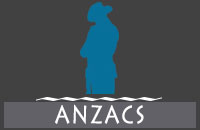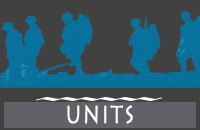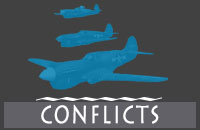Part of the 17th Brigade of the 6th Australian Division, the 2/6th Battalion opened its headquarters at the Royal Melbourne Showgrounds on 25 October 1939. "Nothing over 2/6" was a well-known advertising slogan for Coles department store at the time and thus the battalion adopted the motto "nothing over us". It relocated to the newly-established camp at Puckapunyal on 3 November to carry out its basic training, and departed Melbourne for service overseas on 14 April 1940.
Arriving in the Middle East on 18 May, the 2/6th spent the rest of 1940 conducting further training in Palestine and Egypt. Just before Christmas, it embarked on its first campaign, against the Italians in eastern Libya. Its first battle, fought at Bardia between 3 and 5 January 1941, was costly. The battalion was given a diversionary role and a series of misunderstandings resulted in heavy casualties. It fought again at Tobruk between 21 and 22 January with much more success, and finished its activities in Libya by providing garrisons for Barce and Benghazi.
In early April, the 2/6th, with the rest of the 6th Division, deployed to Greece to resist the anticipated German invasion. For the 2/6th, the Greek campaign was essentially one long withdrawal through a series of rearguard positions, beginning on 16 April. In the last days of the campaign its companies were dispersed by higher command; some were subsequently evacuated by sea between 26 and 29 April, but approximately a quarter of the battalion was left behind and taken prisoner. Some of the evacuees were landed on Crete and, after fighting with the 17th Brigade Composite Battalion, many of these men were also captured.
Rebuilt in Palestine, the 2/6th moved into Syria in December 1941 to join the garrison force there. It left the Middle East on 10 March 1942 but was diverted to Ceylon (present-day Sri Lanka), with the rest of the 16th and 17th Brigades, and between mid-March and mid-July defended the island from possible Japanese attack. The 2/6th finally disembarked in Australia, at Melbourne, on 4 August 1942.
The 2/6th first met the Japanese in battle in mid-January 1943 as part of the force defending Wau in New Guinea. After much desperate fighting, Wau was made secure in early February. The 2/6th subsequently participated in the drive towards Salamaua. It resisted a determined Japanese counter-attack at Lababia Ridge between 20 and 22 June, and was particularly active around Komiatum Ridge in August. After arriving back in Australia on 23 September 1943, the battalion spent most of 1944 training in northern Queensland.
On 6 December 1944, the 2/6th disembarked at Aitape in New Guinea for its final campaign and spent much of the next eight months engaged in arduous patrolling to clear the Japanese from the Torricelli and Prince Alexander mountain ranges. It was still engaged in this role when the war ended on 15 August 1945. The battalion embarked to return to Australia on 13 December and disbanded at Puckapunyal on 18 February 1946.
Source and more information: Australian War Memorial website










